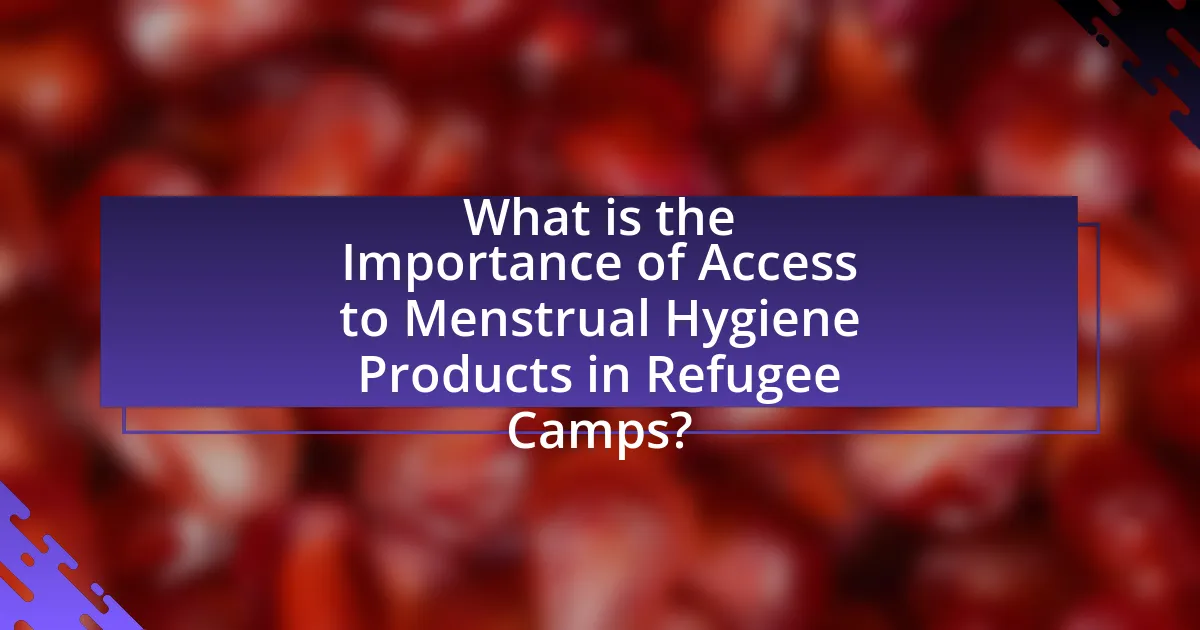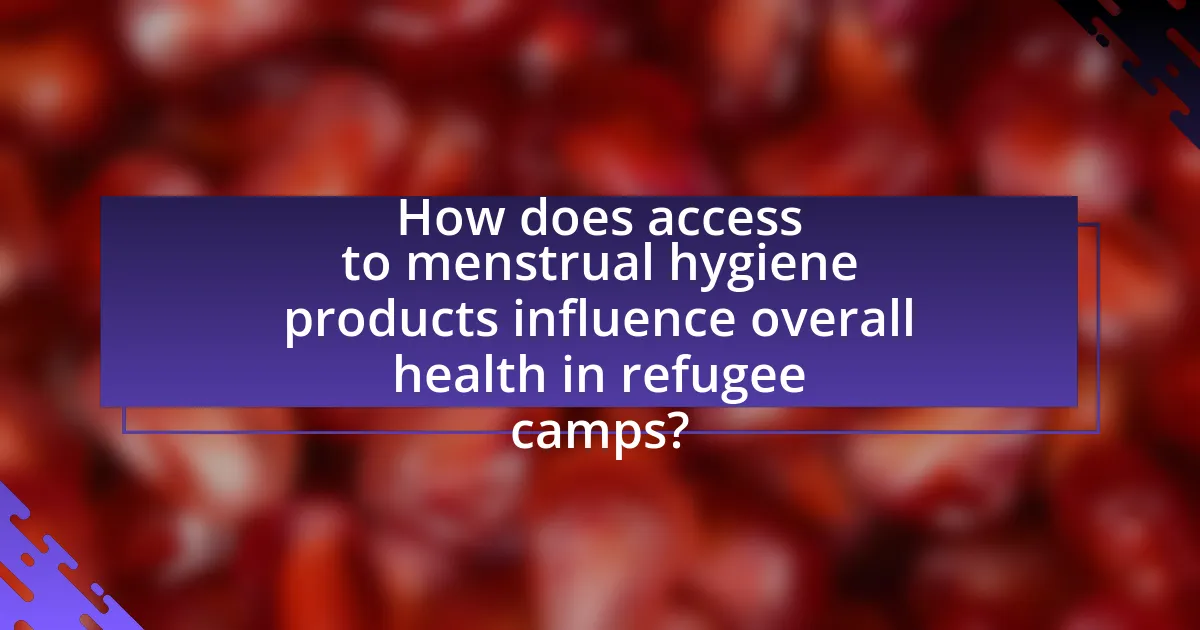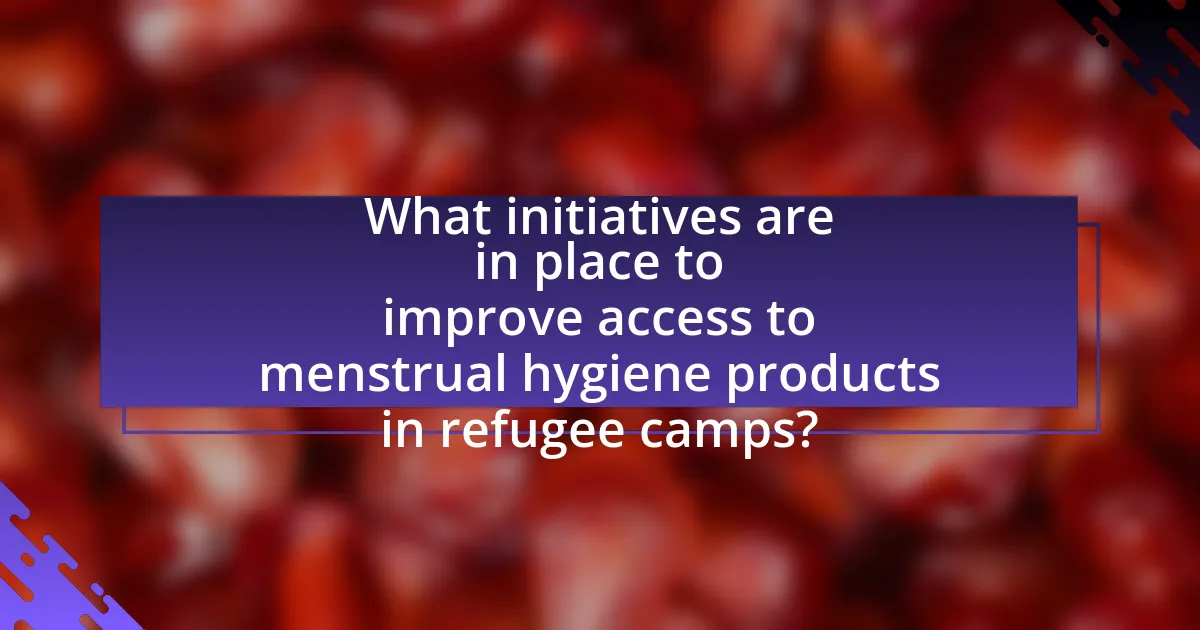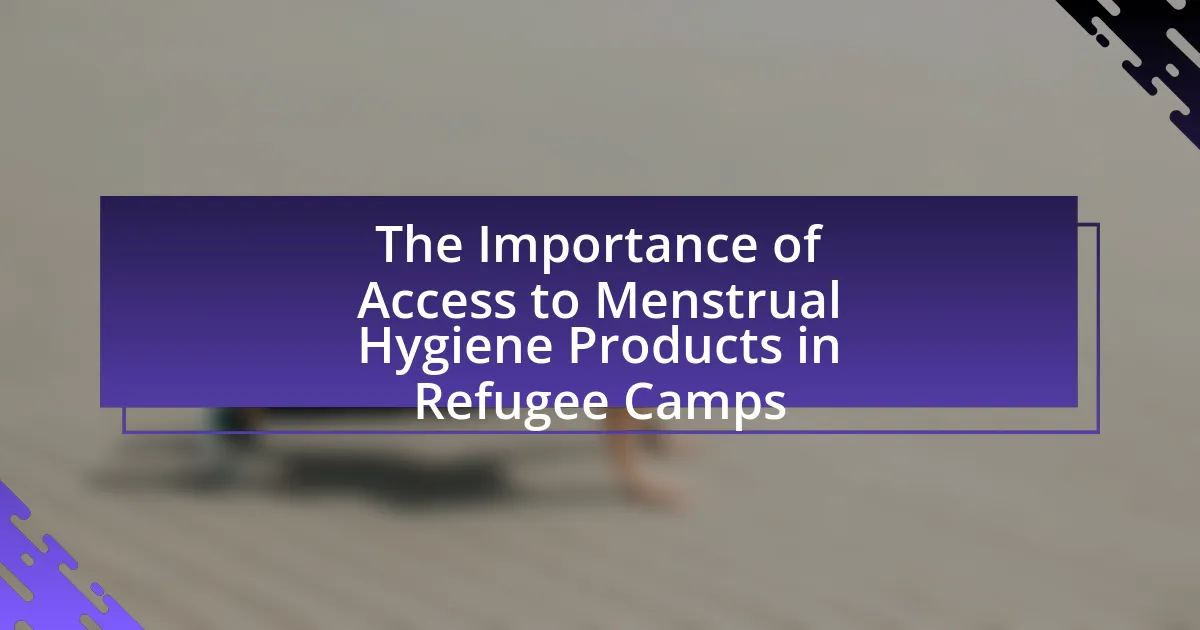Access to menstrual hygiene products in refugee camps is essential for the health, dignity, and well-being of women and girls. The lack of these products can lead to serious health risks, increased stigma, and hindered participation in education and community life. This article examines the health implications of inadequate menstrual hygiene management, the psychological effects on women, and the barriers to access in refugee settings. It also highlights the initiatives and organizations working to improve access to these crucial products, emphasizing the importance of education and community involvement in promoting sustainable menstrual hygiene practices.

What is the Importance of Access to Menstrual Hygiene Products in Refugee Camps?
Access to menstrual hygiene products in refugee camps is crucial for the health, dignity, and well-being of women and girls. Without these products, individuals face increased health risks, including infections and reproductive health issues, as well as psychological distress due to the stigma associated with menstruation. Research by the United Nations High Commissioner for Refugees (UNHCR) indicates that inadequate access to menstrual hygiene products can lead to school absenteeism among adolescent girls, further exacerbating gender inequality in education. Providing these products not only supports physical health but also empowers women and girls, allowing them to participate fully in community life and maintain their dignity during challenging circumstances.
Why is access to menstrual hygiene products crucial for women in refugee camps?
Access to menstrual hygiene products is crucial for women in refugee camps because it directly impacts their health, dignity, and overall well-being. Without these products, women face increased risks of infections, psychological distress, and social stigma, which can hinder their ability to participate in daily activities and access essential services. Research indicates that inadequate menstrual hygiene management can lead to health complications, as women may resort to unsafe alternatives, increasing their vulnerability to reproductive health issues. Furthermore, the lack of access to menstrual hygiene products can exacerbate gender inequalities, limiting women’s mobility and participation in education and economic opportunities.
What are the health implications of inadequate menstrual hygiene management?
Inadequate menstrual hygiene management can lead to severe health implications, including increased risk of reproductive tract infections, urinary tract infections, and other gynecological disorders. Studies indicate that women and girls lacking proper menstrual hygiene facilities are more susceptible to infections due to the use of unhygienic materials and poor disposal methods. For instance, a study published in the Journal of Women’s Health found that inadequate menstrual hygiene practices significantly correlated with higher rates of bacterial vaginosis and candidiasis among women in low-resource settings. Furthermore, the psychological impact, such as stress and anxiety related to menstruation, can also affect overall health and well-being.
How does access to menstrual hygiene products affect women’s dignity and well-being?
Access to menstrual hygiene products significantly enhances women’s dignity and well-being by allowing them to manage their menstrual health with confidence and privacy. When women have access to these products, they experience less stigma and shame associated with menstruation, which is crucial for maintaining their self-esteem and social participation. Research indicates that inadequate access to menstrual hygiene products can lead to increased absenteeism from school and work, negatively impacting women’s education and economic opportunities. For instance, a study by the Water Supply and Sanitation Collaborative Council found that 1 in 10 girls in Africa misses school during their menstrual cycle due to a lack of sanitary products, highlighting the direct link between access to these products and women’s overall well-being and empowerment.
What challenges do women face regarding menstrual hygiene in refugee camps?
Women in refugee camps face significant challenges regarding menstrual hygiene, primarily due to a lack of access to sanitary products, inadequate facilities for privacy, and insufficient education on menstrual health. The absence of menstrual hygiene products, such as pads and tampons, forces many women to resort to unsafe alternatives, which can lead to health complications. Furthermore, the limited availability of private spaces for changing and disposing of menstrual products exacerbates feelings of shame and discomfort, impacting women’s dignity and mental health. According to a study by the United Nations High Commissioner for Refugees (UNHCR), only 50% of refugee women have access to basic menstrual hygiene supplies, highlighting the urgent need for improved resources and education in these settings.
What barriers prevent access to menstrual hygiene products in these settings?
Barriers that prevent access to menstrual hygiene products in refugee camps include financial constraints, cultural stigmas, and inadequate supply chains. Financial constraints limit the ability of individuals to purchase necessary products, as many refugees live in poverty with limited resources. Cultural stigmas surrounding menstruation can lead to a lack of open discussion and education about menstrual health, further exacerbating the issue. Additionally, inadequate supply chains hinder the consistent availability of products, as logistical challenges often prevent timely delivery to those in need. These factors collectively contribute to the difficulty in accessing menstrual hygiene products in these settings.
How do cultural attitudes impact menstrual hygiene practices in refugee camps?
Cultural attitudes significantly influence menstrual hygiene practices in refugee camps by shaping beliefs about menstruation and the associated stigma. In many cultures, menstruation is viewed as a taboo subject, leading to a lack of open discussion and education about menstrual hygiene. This cultural stigma can result in inadequate access to menstrual hygiene products, as individuals may feel embarrassed to seek them out or may not prioritize them due to societal norms. For instance, a study by the United Nations High Commissioner for Refugees (UNHCR) found that in some refugee settings, cultural beliefs led to the use of unsafe materials for menstrual management, increasing health risks. Additionally, cultural attitudes can dictate the privacy and facilities available for menstrual hygiene, further impacting the ability of individuals to manage their menstruation safely and effectively.

How does access to menstrual hygiene products influence overall health in refugee camps?
Access to menstrual hygiene products significantly influences overall health in refugee camps by reducing the risk of infections and promoting mental well-being. When individuals have access to sanitary products, they are less likely to experience health complications such as urinary tract infections or reproductive health issues, which can arise from the use of unhygienic materials. Furthermore, the availability of these products contributes to the dignity and psychological health of menstruators, allowing them to participate fully in daily activities, including education and work, without the stigma or discomfort associated with menstruation. Studies indicate that inadequate menstrual hygiene management can lead to increased absenteeism from school and work, further exacerbating the challenges faced in refugee settings.
What are the physical health outcomes associated with poor menstrual hygiene?
Poor menstrual hygiene can lead to several adverse physical health outcomes, including urinary tract infections (UTIs), reproductive tract infections (RTIs), and increased susceptibility to sexually transmitted infections (STIs). Research indicates that inadequate menstrual hygiene practices, such as the use of unclean materials or infrequent changing of sanitary products, significantly elevate the risk of these infections. For instance, a study published in the Journal of Women’s Health found that women with poor menstrual hygiene were three times more likely to experience UTIs compared to those who practiced proper hygiene. Additionally, the lack of access to clean menstrual products can result in skin irritations and infections, further compounding health issues.
How can access to menstrual hygiene products reduce the risk of infections?
Access to menstrual hygiene products significantly reduces the risk of infections by promoting proper menstrual management and hygiene practices. When individuals have access to clean and safe products, they are less likely to resort to unhygienic alternatives, which can introduce bacteria and lead to infections such as urinary tract infections or reproductive tract infections. Studies indicate that inadequate menstrual hygiene can increase the risk of infections by up to 70%, highlighting the critical role that access to appropriate products plays in maintaining health and preventing disease.
What role does education play in improving menstrual hygiene practices?
Education plays a crucial role in improving menstrual hygiene practices by providing individuals with essential knowledge about menstrual health and hygiene management. This knowledge empowers individuals to make informed decisions regarding their menstrual care, leading to better health outcomes. For instance, studies have shown that educational programs focused on menstrual hygiene can significantly increase awareness and understanding of proper hygiene practices, which in turn reduces the risk of infections and enhances overall well-being. Furthermore, education helps to dismantle cultural stigmas surrounding menstruation, encouraging open discussions and fostering a supportive environment for those experiencing menstruation.
How does menstrual hygiene management affect mental health in refugee settings?
Menstrual hygiene management significantly impacts mental health in refugee settings by influencing feelings of dignity, safety, and social inclusion. Inadequate access to menstrual hygiene products can lead to anxiety, stress, and social isolation among women and girls, as they may fear stigma or embarrassment during menstruation. Research indicates that 70% of women in refugee camps report feeling anxious about managing their periods due to a lack of resources, which can exacerbate mental health issues. Furthermore, the inability to maintain hygiene can lead to health complications, further contributing to psychological distress. Thus, effective menstrual hygiene management is crucial for promoting mental well-being in these vulnerable populations.
What psychological effects can arise from inadequate menstrual hygiene access?
Inadequate menstrual hygiene access can lead to significant psychological effects, including anxiety, depression, and low self-esteem. Women and girls who lack proper menstrual hygiene products often experience feelings of shame and embarrassment, which can result in social isolation and withdrawal from daily activities, such as school or work. Research indicates that 70% of girls in some refugee settings report missing school during menstruation due to inadequate hygiene resources, exacerbating feelings of inadequacy and impacting their educational opportunities. Furthermore, the stigma surrounding menstruation can lead to increased stress and mental health issues, as individuals may fear judgment or discrimination from their peers and communities.
How can improved access to menstrual hygiene products enhance women’s empowerment?
Improved access to menstrual hygiene products enhances women’s empowerment by enabling them to manage their menstruation with dignity and confidence. This access reduces absenteeism from school and work, allowing women and girls to participate fully in educational and economic activities. For instance, a study by the Water Supply and Sanitation Collaborative Council found that girls who have access to menstrual hygiene products are 2.5 times more likely to attend school during their menstrual cycle. Furthermore, access to these products fosters a sense of autonomy and self-worth, as women can maintain their health and hygiene without relying on others. This empowerment is crucial in refugee camps, where women often face additional challenges; thus, providing menstrual hygiene products is a vital step toward gender equality and improved quality of life.

What initiatives are in place to improve access to menstrual hygiene products in refugee camps?
Various initiatives are implemented to improve access to menstrual hygiene products in refugee camps. Organizations such as the United Nations High Commissioner for Refugees (UNHCR) and non-governmental organizations (NGOs) distribute menstrual hygiene kits that include sanitary pads, soap, and underwear to women and girls in these camps. Additionally, educational programs are conducted to raise awareness about menstrual health and hygiene, ensuring that women understand how to use the products effectively. For instance, a study by the International Rescue Committee highlighted that providing menstrual hygiene management training significantly increased the proper use of hygiene products among refugees. These initiatives are crucial for maintaining dignity and health among displaced populations.
What organizations are working to provide menstrual hygiene products in refugee settings?
Organizations working to provide menstrual hygiene products in refugee settings include the United Nations High Commissioner for Refugees (UNHCR), which implements programs to distribute hygiene kits, and the International Rescue Committee (IRC), which focuses on ensuring access to menstrual health supplies. Additionally, organizations like Plan International and WaterAid are actively involved in providing menstrual hygiene management support in refugee camps. These organizations recognize the critical need for menstrual hygiene products to promote health and dignity among displaced women and girls, particularly in emergency situations.
How do these organizations address the unique needs of women in camps?
Organizations address the unique needs of women in camps by providing access to menstrual hygiene products, ensuring privacy, and offering education on reproductive health. For instance, the United Nations High Commissioner for Refugees (UNHCR) has implemented programs that distribute menstrual hygiene kits, which include sanitary pads, soap, and underwear, to women in refugee camps. This initiative is crucial as studies indicate that lack of access to these products can lead to health issues and social stigma, affecting women’s dignity and participation in daily activities. Furthermore, organizations often establish safe spaces for women to discuss their health needs and receive support, thereby fostering a community that prioritizes women’s health and well-being in challenging environments.
What best practices can be implemented to ensure sustainable access to menstrual hygiene products?
To ensure sustainable access to menstrual hygiene products, implementing community-based distribution systems is essential. These systems can be established through partnerships with local organizations, which can facilitate the consistent supply of products tailored to the needs of the community. Research indicates that when menstrual hygiene products are distributed through trusted local entities, such as women’s groups or health clinics, the uptake and sustainability of access significantly improve. For instance, a study by the United Nations Population Fund (UNFPA) highlights that in refugee settings, providing menstrual hygiene management education alongside product distribution increases awareness and reduces stigma, leading to better health outcomes. Additionally, promoting the use of reusable menstrual products can enhance sustainability, as they reduce waste and lower long-term costs for individuals and communities.
How can community involvement enhance the distribution of menstrual hygiene products?
Community involvement can enhance the distribution of menstrual hygiene products by fostering local ownership and ensuring culturally appropriate solutions. Engaging community members in the planning and implementation of distribution strategies leads to increased awareness and acceptance of menstrual hygiene management. For instance, a study by the International Rescue Committee found that when local women were involved in the distribution process, there was a 50% increase in product uptake compared to top-down approaches. This involvement not only addresses logistical challenges but also builds trust within the community, ensuring that the products meet the specific needs and preferences of the users.
What role does education play in promoting sustainable menstrual hygiene practices?
Education plays a crucial role in promoting sustainable menstrual hygiene practices by equipping individuals with knowledge about menstrual health, hygiene management, and environmentally friendly options. Through educational programs, individuals learn about the importance of using sustainable products, such as reusable menstrual cups or cloth pads, which can significantly reduce waste compared to disposable products. Research indicates that informed individuals are more likely to adopt practices that not only enhance their health but also contribute to environmental sustainability. For instance, a study published in the Journal of Water, Sanitation and Hygiene for Development highlights that education on menstrual hygiene management leads to improved health outcomes and greater acceptance of sustainable practices in communities.
What practical steps can be taken to improve access to menstrual hygiene products in refugee camps?
To improve access to menstrual hygiene products in refugee camps, organizations can establish distribution points within the camps to ensure easy access for women and girls. This can be achieved by collaborating with local NGOs and health agencies to identify the needs and preferences of the community. For instance, a study by the United Nations High Commissioner for Refugees (UNHCR) highlights that providing menstrual hygiene kits, which include sanitary pads, soap, and disposal bags, significantly enhances the dignity and health of women in refugee settings. Additionally, conducting awareness campaigns about menstrual health can empower women to seek and utilize these products effectively.



